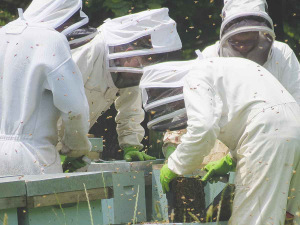Damien O’Connor: NZ united on global trade
When it comes to international trade, politicians from all sides of the aisle are united, says Labour's trade spokesman Damien O'Connor.
 Kiwi mānuka honey sales to the EU have risen dramatically in recent years reaching $60 million last year.
Kiwi mānuka honey sales to the EU have risen dramatically in recent years reaching $60 million last year.
The impact of a new European Union free trade agreement removing a 17.3% tariff on NZ-sourced honey in July is translating into increasing sales volumes, according to one exporter.
Aided by strong harvest volumes, mānuka honey exporters have recorded a surge in European demand as the removal of tariffs aligns with a sliding NZ dollar, reducing the cost of Kiwi imports by around 8% against the Euro compared to the same time last year.
Driven by growing interest from German consumers for Kiwi mānuka honey, sales to the EU have risen dramatically in recent years reaching $60 million last year, or 12% of the $500m export market.
Industry experts say the 2023 season is expected to be strong, with high moisture levels at the base of the mānuka trees and La Nina weather patterns set to contribute to elevated nectar flows over the coming months.
Additionally, a 40% drop in hive numbers around the country is providing more choice of placement locations for Kiwi apiarists and a higher quality export product.
“Too many beehives placed in these areas targeting mānuka overstocked the area because there’s only so much nectar, [with] yields per hive decreasing by a considerable amount,” says Naki Honey executive Brett Mascull.
“Because of the lesser amount of beehives, you can expect really strong yields per beehive for mānuka honey.”
Naki Honey global market manager Derek Burchell-Burger says the response from the EU importers following the removal of import tariffs was immediate, contributing to an annual sales growth of over 15%.
“Despite consumer confidence being impacted by the war in Ukraine the pandemic has helped boost consumer interest in the wellness features of the product, with premium mānuka honey retailing for up to $800 per kg in Europe and landing in Europe for 27% less cost than a year ago.”
He says there is growing international recognition of the benefits of mānuka honey and harvest volumes are up substantially.
This has allowed us to increase our inventory to over 300 tonnes.”
Burchell-Burger adds that the falling dollar is helping to secure new wholesale accounts throughout the EU, offsetting the impact of war and inflation on spending in that market and resulting in exports growing.
Naki Honey’s distribution model in European markets operates differently to those in Asia where they tend to use established distribution partners with local networks.
In EU countries like Germany and Sweden the product is more likely to be sold through pharmacies, supermarkets and naturopathic practitioners necessitating the development of relationships at retail level.
“Even prior to the pandemic, European consumers had a high awareness of the medicinal aspects of mānuka honey,” says Burchell- Burger.
While Germany is the largest EU importer of honey from non-EU countries and second largest honey importer worldwide, France is second in the EU (fifth worldwide) with almost $1bn of the product consumed annually.
Naki Honey is currently looking to France as the next untapped market for mānuka honey. Sales to other European countries including Germany, The Czech Republic, and The Netherlands have also expanded recently.
Agrisea NZ has appointed Craig Hudson as it's new chief growth officer.
State farmer Landcorp, trading as Pamu, is a forecasting a full-year net profit of around $100 million.
Tony Aitken, chief executive of Ruralco, has been awarded the Excellence in Business Leadership Award at the ANZ Business of the Year Awards.
Global trade has been thrown into another bout of uncertainty following the overnight ruling by US Supreme Court, striking down President Donald Trump's decision to impose additional tariffs on trading partners.
Controls on the movement of fruit and vegetables in the Auckland suburb of Mt Roskill have been lifted.
Fonterra farmer shareholders and unit holders are in line for another payment in April.

OPINION: Here w go: the election date is set for November 7 and the politicians are out of the gate…
OPINION: ECan data was released a few days ago showing Canterbury farmers have made “giant strides on environmental performance”.